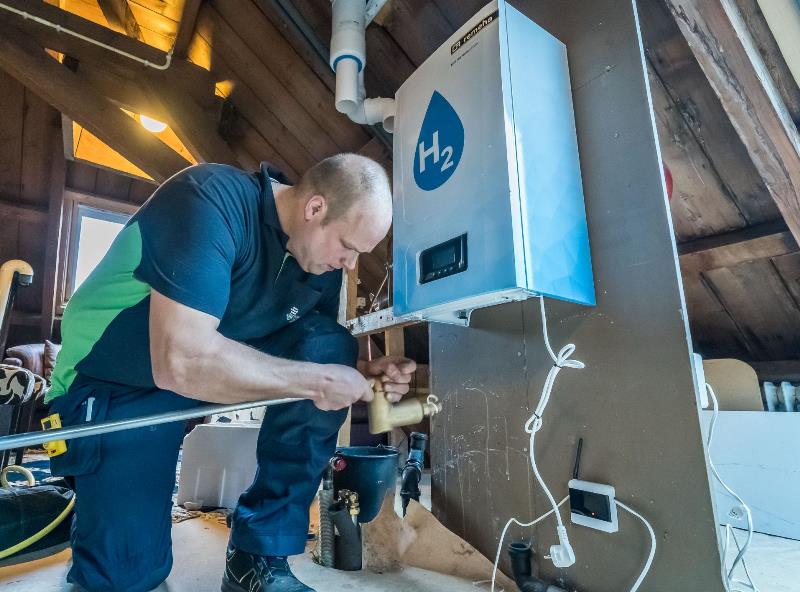
Baxi’s Renewables Director, Harriet Evans, looks at the immediate, medium and longer term options for low carbon heating in homes.
Although there is currently much debate about how we will heat homes in the future, the reality is that there is no silver bullet to deliver net zero for the heating and hot water industry. Rather, a reliance on multiple technologies is likely to be key, with the general consensus seeming to be that heat pumps, hybrid systems, heat networks and in the longer term hydrogen, will all play their part in the process. But what are the most important aspects that heating engineers need to know about each of them now?
Heat pumps
The popularity of domestic heat pumps is finally gaining momentum but there remains plenty of work to be done when it comes to educating installers and homeowners on the technology. Using refrigerant technology to heat hot water, radiators and underfloor heating systems is an attractive proposition for reducing emissions from gas; the potential efficiency is up to 400% in many cases.
An EUA report suggests that over half of the UK’s housing stock could be heated using ASHP systems – that’s around 12 million homes. These properties are regarded as being the right size, well insulated and suitable for modular ASHP installations. The other half are typically older, larger and less well insulated, making them more challenging to benefit from an ASHP solution.
To incentivise more installations, the Government is currently running the Boiler Upgrade Scheme (BUS), which gives grants of up to £5,000 towards the total installation cost (alternative funding offered via Home Energy Scotland Scheme in Scotland). But this is a finite pot with limited financial contribution and it’s not clear what will replace it when the money runs out. This is a good time to be working with customers to see if they would benefit from an ASHP solution on its own, or one combined with an additional heat source alongside.
Heating engineers who want to access the grant need to be Microgeneration Certification Scheme (MCS) accredited. Part of this accreditation means proving competence and completion of heat pump installation & design training, a Water Regulations Approval Scheme (WRAS) qualification, and an NVQ level 2 or 3, or equivalent.
To help, installers can access a £500 government Heat Training Grant if they enrol on one of the accredited courses (such as the BPEC courses that are run in house at Baxi). Baxi have pledged to match this voucher value by offering installers a further £500 credit to purchase a Baxi ASHP product, once completed.
Hybrid systems
A popular solution in European countries such as the Netherlands, hybrid heating systems lower emissions from home heating by decreasing the dependency on gas as the sole heat provider. Instead, two different energy sources, in most cases an air source heat pump and a natural gas boiler, manage the required heat, where most of the time the ASHP provides warmth. The boiler is used solely for hot water, but can also kick-in when more warmth is needed quickly (i.e. during a cold snap).
These systems can already reduce emissions dramatically when compared with a gas boiler only system. For our older buildings with less effective insulation, hybrid systems could be a more suitable and affordable solution. The ASHP could be a small, less expensive unit, as it would be supported by conventional gas for heat or hot water during the coldest periods when the ASHP would need to work the hardest.
Unfortunately a hybrid design solution is not currently eligible for the BUS grant. Last year, the Heating and Hot water Industry Council (HHIC) called for greater support for hybrids and it is encouraging that Government’s Improving boiler standards and efficiency consultation is asking the industry to comment on hybrid ASHP and gas boiler systems as a potential route to reaching its decarbonisation targets.
Heating engineers should be encouraged to familiarise themselves with the hybrid concept as this could be a more favourable option for consumers wanting to make a change, especially if it is recognised for funding in the future.
Heat networks
Another potential route to decarbonising multiple homes and businesses is through heat networks. Using a central plant room with a large boiler, combined heat and power (CHP) unit or large industrial scale heat pumps, hot water is distributed through pipework to the different flats within a building or to homes on a linked network in a district heating scheme. A heat interface unit (HIU) in each home provides heat and hot water on demand, giving customers the same individual control they would have from a single boiler.
Heat networks reduce emissions by centralising the energy source and improving the maintenance and longevity of the equipment to benefit a combined number of properties. In the event of system failure, there is reduced downtime and easy access for servicing, which is limited to energy centres of plant rooms and in turn reduces maintenance visits to individual residents.
For engineers who work on multiple occupancy buildings like apartments, HIUs may be more familiar. However, with more housebuilders looking at district heating schemes as a way of decarbonising entire developments, callouts involving HIUs may become more common as heat networks grow in popularity. Engineers becoming familiar with the technology, installation and maintenance, will be well placed as heat networks grow across the UK.
What about hydrogen?
Hydrogen is generally regarded as being an important part of our overall future energy mix. But it’s not yet clear how much of a role hydrogen will play in domestic heating and hot water, replacing today’s natural gas in the gas grid. Hydrogen gas can be completely carbon free (green hydrogen) if it’s produced using renewable energy such as wind or solar PV.
Today, Baxi and other industry players have been participating in important hydrogen demonstration projects and trials across the country. Baxi has supplied its hydrogen boilers to projects including Hy4Heat, HyStreet, Northern Gas Network’s 100% Hydrogen Home near Gateshead, and is participating in SGN’s H100 Fife project involving 300 homes in Scotland converting to 100% hydrogen.
Hydrogen is unlikely to be available to home-owners for several years, but the Government is deciding on whether only hydrogen-ready boilers should be installed after 2026. That would give a strong signal that hydrogen will play a part in home heating in the future, but it would still be unclear when different parts of the grid could be converted from natural gas to hydrogen.
Hydrogen boilers will be installed much like traditional gas boilers, and so the training being developed for them will be integrated with existing qualifications. By easing the transition to hydrogen by mandating hydrogen ready appliances, installers may be able to get hands-on with the new tech in a few year’s time.
For more on Baxi’s view on the future of heat please click here.













